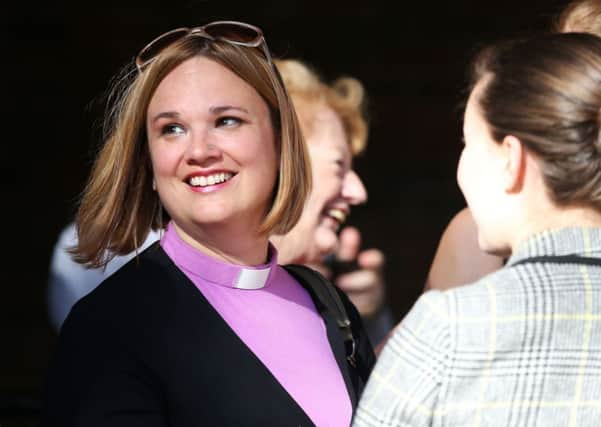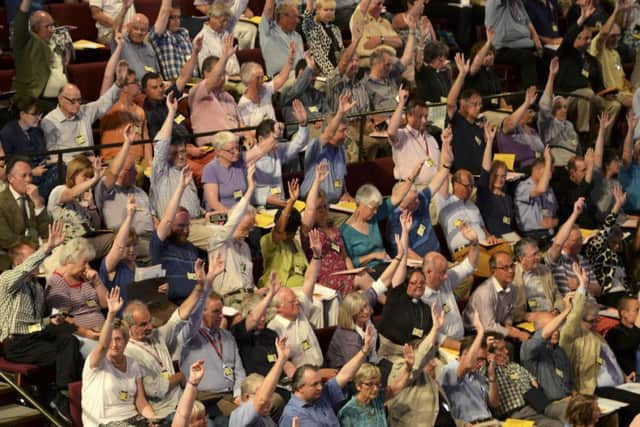Shouts of delight as Church approves women bishops


Members of the Church’s governing body voted in favour of a measure allowing women bishops in a historic vote at York University.
The legislation received the necessary two thirds majority in all three Houses of the General Synod with 37 bishops voting in favour with two against and one abstention, 162 clergy in favour, 25 against and four abstentions.
Advertisement
Hide AdAdvertisement
Hide AdIn the crucial lay votes there were 152 votes in favour, 45 against and five abstentions.


In spite of an appeal from the Archbishop of York, Dr John Sentamu, for the result to be heard in silence as is traditional in the Church of England at key votes, there was some clapping and shouts of “brill” from within the hall when the outcome was announced.
The success in the make-or-break vote comes after a plan to introduce women bishops collapsed in November 2012 when it was derailed by just six votes cast by lay members.
The Archbishop of Canterbury, the Most Rev Justin Welby, staked his authority on a new set of proposals, bringing in mediation and conflict experts in an effort to resolve differences.
Advertisement
Hide AdAdvertisement
Hide AdSpeaking in the debate, Archbishop Welby assured traditionalists that Church of England bishops were committed to meeting their needs should they pass the legislation.
“I expect and hope that this vote will go through and I rejoice in it. But I also rejoice that we promise to seek the flourishing in the Church of all those who disagree,” he said.
“If I did not think that was likely I could not support this legislation. You don’t chuck out family or even make it difficult for them to be at home, you love them and seek their well-being even when you disagree.
“The House of Bishops means what we say.”
Earlier in an emotional debate, the General Synod heard from a series of speakers who said they had voted against the legislation in November 2012 but would now cast their votes in favour or abstain.
Advertisement
Hide AdAdvertisement
Hide AdDr Philip Giddings, from the Oxford Diocese, and head of the House of Laity, announced that he would be voting in favour, having voted against in November 2012.
He told the General Synod: “I will vote for this legislation today.”
Prudence Dailey, from the Oxford Diocese, who voted against in November 2012, told members she would abstain.
“I intend to abstain because I believe we have arrived at a solution which the majority of people in all parts of the Church can agree to live with, I have no desire to block that,” she said.
Advertisement
Hide AdAdvertisement
Hide AdShe said she hoped and expected the legislation to be passed, vindicating the concerns expressed by opponents of the plans put before the General Synod in November 2012.
“In November 2012 in the aftermath of the vote, it is hard for me to forget the bile, vitriol and disapprobation that was heaped on the heads of those, particularly those in the House of Laity, who defeated the measure. If I stick my head above the parapet I expect to have bricks thrown at me, I have never minded that.
“What I did mind was the implication that we were somehow, if we were grudgingly allowed these opinions, not allowed to express these through our votes.”
Adrian Vincent, a lay member from the Guildford Diocese, drew an emotional response from a prominent pro-women campaigner when he said he would be voting in favour of the legislation in spite of his membership of the Catholic group.
He voted against in November 2012.
Advertisement
Hide AdAdvertisement
Hide Ad“I shall be voting in favour today. By doing so, I am betraying what I believe, I am betraying those who trusted in me,” he said. “I hope that the promised commitment to mutual flourishing is not a commitment that will run out of steam in a few years.”
He was praised by Christina Rees, a prominent supporter of women bishops from the St Albans Diocese.
Close to tears, she said: “Adrian Vincent has made a sacrificial decision today for the sake of the Church, he has shown his loyalty as an Anglican and as a member of the Church of England. I was not prepared for what he said, it absolutely stunned me.”
Before the crucial vote, members of the General Synod spent some moments in prayer and silent reflection.
Advertisement
Hide AdAdvertisement
Hide AdAfter the vote, the Archbishop of York, Dr John Sentamu, led the General Synod in a rendition of We are Marching in the Light of God, with members clapping along and at least one woman cleric seen swaying to the beat.
Two other votes were passed by simple majorities - one requesting Royal Assent and the other repealing the Act of Synod which provides for so-called “flying bishops” to minister to parishes which do not accept the authority of women priests. The plan will now go to the ecclesiastical committe of Parliament and the House of Commons and the House of Lords for consideration. The General Synod would then meet on November 17 to formally declare that women can be bishops.
Prime Minister David Cameron welcomed the General Synod vote as a “great day for the Church and for equality”.
The move was also welcomed by Deputy Prime Minister Nick Clegg who called it a “watershed moment for the Church of England” and Labour leader Ed Miliband who described it as “wonderful news”.
Advertisement
Hide AdAdvertisement
Hide AdHere are some of the clergy who are seen as key contenders to be made the first women bishops in the Church of England:
• The Very Rev Vivienne Faull, 59, Dean of York Minster
Ms Faull is widely believed to be the favourite to be appointed as first woman bishop in the Church of England.
She studied at the Queen’s School Chester and St Hilda’s College, Oxford, and was among the first batch of more than 1,000 women ordained in the Church of England.
A former chaplain to Clare College, Cambridge, Ms Faull was the first woman to hold such an appointment at either Oxford or Cambridge universities.
Advertisement
Hide AdAdvertisement
Hide AdIn 2000, she became the first woman appointed to run any English cathedral when she was made provost of Leicester Cathedral.
She was named dean of York Minster in 2012, with a staff of 160 and 600 volunteers to coordinate.
When she started as a priest, Ms Faull said it was not unknown for a woman to be forbidden to take funerals because as she once explained: “The local population took the view that if a woman led the funeral service, how would you know that you were properly dead?”
• The Very Rev Dr Jane Hedges, 58, Dean of Norwich
Dr Hedges, former Canon Steward of Westminster Abbey and Archdeacon of Westminster, was installed last month as Dean of Norwich.
Advertisement
Hide AdAdvertisement
Hide AdAt Westminster Abbey, Dr Hedges had responsibility for welcoming the abbey’s millions of visitors and pilgrims every year.
She was frequently seen at high-profile services in Westminster Abbey, greeting and accompanying senior members of the Royal Family.
Dr Hedges received widespread coverage when she became the first clergywoman to shake hands with Pope Benedict XVI when he attended a prayer service at Westminster Abbey on his visit to Britain in 2010.
She was brought up in Locks Heath, in Fareham, Hampshire, and left school to work in a bank before taking A-levels at evening classes.
Advertisement
Hide AdAdvertisement
Hide AdShe was among the first group of women to be ordained in 1994.
• The Rev Rose Hudson-Wilkin, 52, chaplain to the House of Commons, a chaplain to the Queen and vicar in two inner city parishes in Hackney, east London
The first black female chaplain to the House of Commons is known for her forthright manner and once reportedly kept a cricket bat next to the door at her east London vicarage for protection against aggressive late night callers.
Ms Hudson-Wilkin was born and brought up in Montego Bay, Jamaica, before settling in the UK in 1985.
She worked in the Midlands before moving to London.
Advertisement
Hide AdAdvertisement
Hide AdShe told The Sunday Telegraph in 2012: “I have no ambition to become a bishop.
“If there are people sitting around, men and women, dying to be bishops, then they must have very sad lives.”
• Canon Philippa Boardman, 50, Canon Treasurer of St Paul’s Cathedral
Among the first women to be ordained in the Church of England in 1994.
Advertisement
Hide AdAdvertisement
Hide AdPresided over the national service to mark the 20th anniversary of women’s ordination in the Church of England in St Paul’s earlier this year with the Archbishop of Canterbury, the Most Rev Justin Welby, acting as her deacon.
Was made an MBE in 2011 for services to heritage in east London, in recognition of her work to renovate and re-open the Church of St Paul in Old Ford, east London.
She told the Guardian that she was wearing something purple - the colour worn by bishops - every day in a protest at the shock defeat of the women bishops legislation at the General Synod in November 2012.
• The Very Rev Dr June Osborne, 61, Dean of Salisbury Cathedral
Advertisement
Hide AdAdvertisement
Hide AdDr Osborne was the first woman to be made a dean of one of the Church of England’s medieval cathedrals when she was appointed at Salisbury Cathedral in 2004.
A graduate in social sciences from Manchester University and married to a QC, Dr Osborne worked as a deacon in the Church of England for 12 years before being ordained in 1994 among the first batch of women priests in the Church of England.
• The Rev Lucy Winkett, Rector of James’s Piccadilly, central London
A former professional singer, Ms Winkett has degrees in history and theology and has also studied at the Royal College of Music.
Advertisement
Hide AdAdvertisement
Hide AdShe served her curacy in Ilford, east London, before being made canon precentor at St Paul’s Cathedral.
She is an author and a regular contributor to BBC Radio 4’s Thought For The Day slot.
She was described by the Bishop of London, The Rt Rev Richard Chartres, as “among the most talented priests in her generation”.
• Dr Miranda Threlfall-Holmes, 40, vicar of Belmont and Pittington, Durham
Advertisement
Hide AdAdvertisement
Hide AdDr Threlfall Holmes, a historian, is a prominent campaigner for women bishops.
She was a university chaplain and research fellow at University College, Durham, and was interim principal of Durham University’s Ustinov College.
An avid user of social media, Dr Threlfall-Holmes compared the Church of England to an abusive husband on her blog in 2012 following controversial last-minute changes to the draft legislation introducing women bishops.
She later withdrew the posting.
She is said to be a former atheist who became a Christian while at Cambridge University.